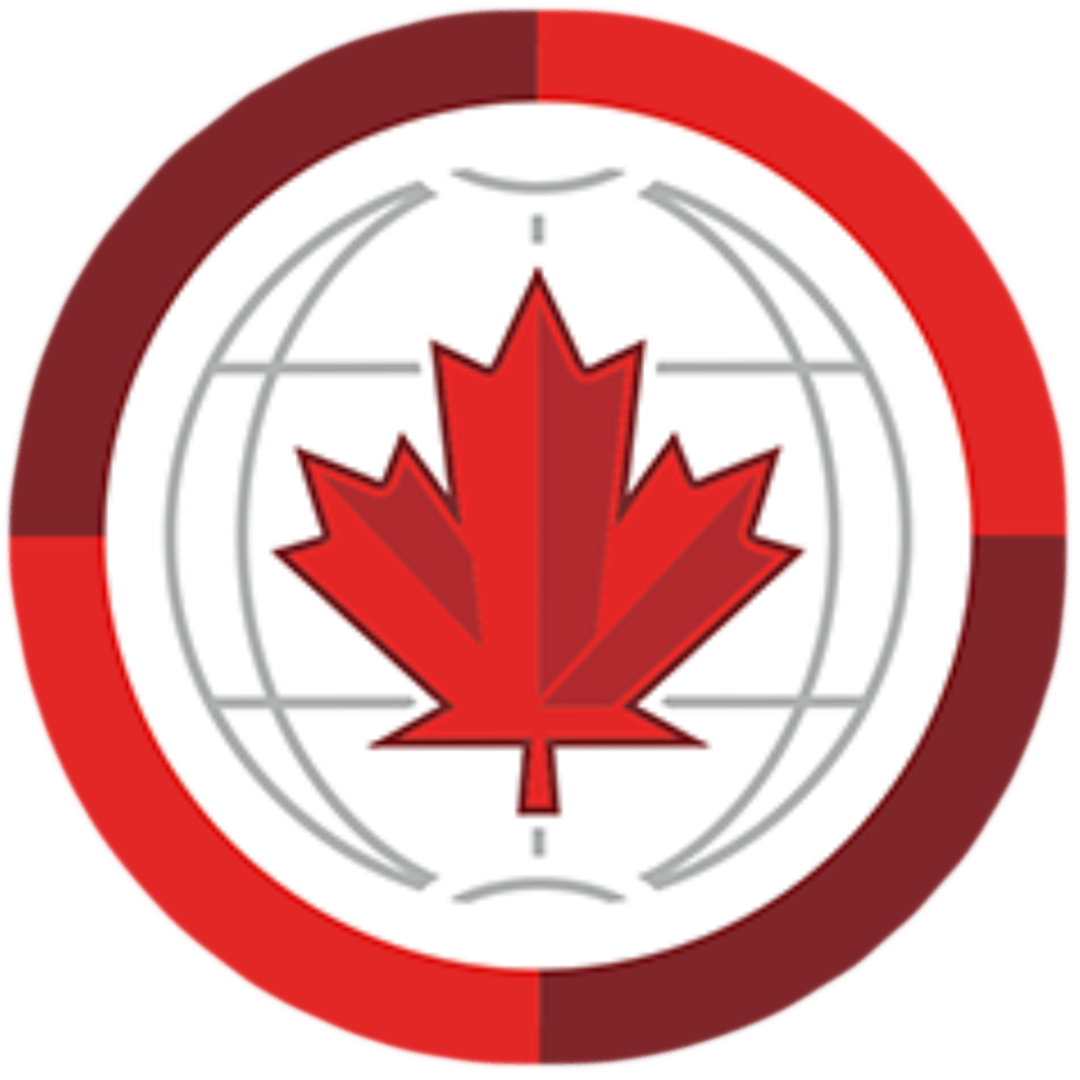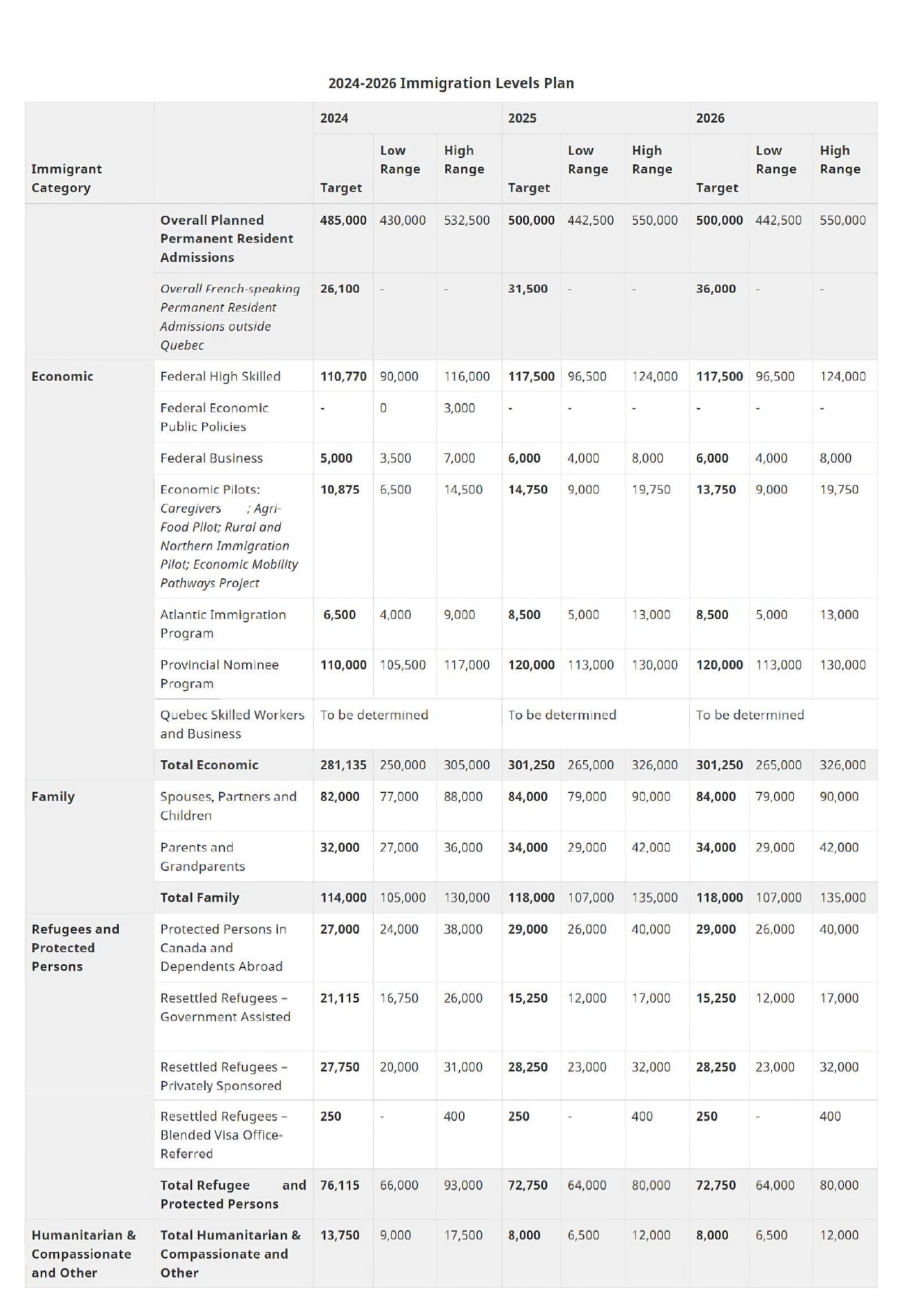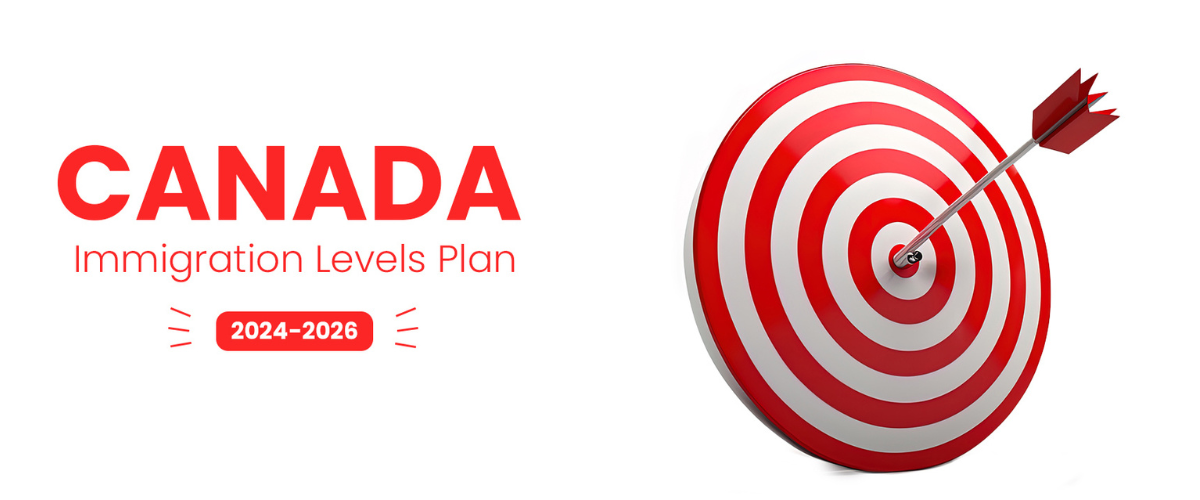
 GET FREE COUNSELLING
GET FREE COUNSELLING
Canada Immigration Levels Plan 2024-2026
On November 1, 2023, Immigration, Refugee, and Citizenship Canada (IRCC) announced a new plan that Canada is setting up to welcome around 500,000 new immigrants annually in the coming year.
IRCC develops programs that help immigrants and Refugees to settle their new life in Canada and become a citizens if an applicant has a permanent resident (PR).
In 2023, IRCC welcomed more than 465,000 immigrants to Canada. However, in this new plan, the target immigrants of 2024 are 485,000 permanent residents. In 2025 and 2026, there will be an additional 500,000 immigrants, the highest level in its history.
The 2024-2025 plan's targets remain consistent with those mentioned in the previous Canada Immigration Levels Plan 2023-2025.
The categories of Immigrants are:
Economic Immigration: This includes Federal High Skilled, Federal Economic Public Policies, Federal Business, Atlantic Immigration Program, Provincial Nominee Program, Quebec Skilled Workers and Business, and Economic Pilots
There are four Pilot Programs under Economic Pilots:
- Agri-Food Pilot
- Caregivers
- Rural and Northern Immigration Pilot
- Economic Mobility Pathways Project
Family Class Immigration: Includes Spouses and partner, dependent children, Parents and Grandparents
Refugees and Protected Persons Immigration: Includes Protected Persons in Canada and Dependents Abroad, Resettled Refugees- Government Assisted, Resettled Refugees- Privately Sponsored, Resettled Refugees- Blended Visa Office-Referred
Humanitarian & Compassionate and Others Immigration: Total Humanitarian & Compassionate and Others

Canada's Immigration aim is to strengthen the country's economy, reunite families, and help refugees while responding to Humanitarian crises and recognizing immigration's rapid growth in recent years.
Quebec operates various immigration programs that allow eligible candidates to secure a position as a Canadian permanent resident. It is the only province in Canada where the official language is French.
The target of French-speaking permanent residents outside Quebec is 4.4% in 2022. The plan includes new annual and progressively increasing targets of 6% in 2024, 7% in 2025, and 8% in 2026.
Contribution of Immigrants in Canada
Immigrants play an essential role in Canada. They contribute to the labor market and growing economy to ensure Canada has the skills to meet the key goals- supporting sustainability initiatives in transitioning to a green (net zero) digital economy.
Therefore, the labour force can take part in critical sectors such as Health, Trades, Transportation, Agriculture, Science, Technology, Engineering, and Mathematics (STEM) are not a barrier to the success and expansion of Canadian businesses.
Family support is important for the well-being and social adaptation of new immigrants. Family Class Immigration also provides economic benefits; spouses or partners can join the workplace and support each other with supplemental household income. Parents and Grandparents can provide childcare.
The Canadian government’s dedication to fulfilling humanitarian commitments continues and protects those in need.
Welcoming new immigrants is not only about fulfilling and increasing the number of targets. The Canadian government also ensures that services and support are provided to the immigrants who are in need, including Healthcare and housing facilities.
The Canadian government makes sure that every immigrant gets appropriate support to achieve positive outcomes.
Canada PR
An individual who has been granted permanent resident status by immigrating to Canada is a Canadian permanent resident.
A Canadian permanent resident can enjoy many benefits like a Canadian citizen. However, permanent residents have to meet specific requirements to maintain their status.
There are many benefits for a permanent resident:
- They can work and live anywhere in Canada: An individual with permanent resident status has a legal right to work and live anywhere in Canada.
- They have universal access to Health care services: A person with permanent resident status can access free health care and social services.
- Family sponsorship: Permanent residents can apply to sponsor their family members while immigrating to Canada, including their spouse or common-law partner, parents and grandparents, and dependent children.
- Free education until secondary level: Children of permanent residents can get free education until secondary level. Post-secondary education is cheaper for permanent residents than for Canadian citizens.
- Right to become a Canadian citizen: After living for three years out of five, a person is eligible to become a Canadian citizen.
Pathways to Immigrate Canada
There are many programs and pathways to immigrate. Canada consistently ranks among the best countries and is known for its positive attitude towards immigration.
- Express Entry: An applicant who wants to immigrate through Express Entry first passes the score given in the Comprehensive Ranking System (CRS) calculator. There are three programs under Express Entry:
- Federal Skilled Worker Program
- Federal Skilled Trades
- Canadian Experience Class
- Provincial Nominee Programs: This program involves ten provinces and three territories, each with its eligibility criteria.
- Business Immigration: This program is for business entrepreneurs who want to work in Canada or start their businesses.
- Sponsorship: If an applicant has any family member as a permanent resident in Canada, then Sponsorship is the best way to reside in Canada. Eligible members to sponsor:
- Spouse or common-law partner
- Dependent child
- Parents and Grandparents
Read these FAQs
No, The immigration levels plan for 2024-2026 states that Canada aims to admit a total of 485,000 permanent residents in 2024.
Effective April 1, 2024, USCIS will increase and create separate filing fees for H-1B, L-1, and other nonimmigrant case types. The H-1B petition fee will rise to $780, from $460, a 70% increase. The L-1 petition fee will increase to $1,385, from $460 – a
International migration probably will increase during the next decades.
Get quickest immigration & news updates
QUICK LINKS
FIND US
The Stark Visas - Best Immigration Consultants in India | Visa Services 1206-1208, 12th Floor, Ansal Tower, Nehru Place, New Delhi - 110019
Delhi Office
+91 8233-05-8233
info@starkvisas.com
1206-1208, 12th Floor, Ansal Tower, Nehru Place, New Delhi - 110019
Ahmedabad Office
+91 8233-05-8233
info@starkvisas.com
Office No. 307, B-Block 3rd Floor, Shreeya Atlanta Nr. Bhagban Party Plot Ahmedabad Gujarat 380054
